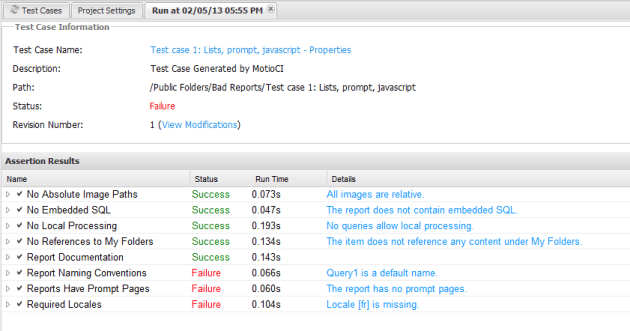A few posts back I gave a sneak peek of a new tool Motio was working on. Recently I was fortunate enough to get into the beta.
The installation, for the most part, is fairly straight forward. You download, decompress, modify a few config files to declare which version of Cognos you’re running, location of your JDK. The only major stumbling block I had was Motio requires some sort of authentication against Cognos. Since I was running Cognos anonymously on my laptop, it simply wouldn’t connect. To get around this, I set up OpenDJ and was able to progress.
Once MotioCI is installed and set up, it will create an instance. Each instance is a connection to a specific Cognos server. You can have as many instances as you have Cognos gateways. You can communicate between instances. So, for example, you can a report in Instance 1 to get specific results, and compare them to results in Instance 2. This is all part of the assertions, which I will get into later.
After you create an instance, you will be prompted to create a new project. Create the new project with a descriptive name and continue. The wizard will walk you through selecting which folders you want to test against which assertions. It comes with a suite of default assertions created by Motio and the Best Practices team. Once selected, it will generate test cases and run them.

After the test cases run, you can see which reports have failures or warnings. You can see the results of the test cases, and the outputs of the reports themselves (if the test cases required the reports to run).

The most interesting part of this tool is the Assertion Studio. This is where you can define the assertions.
Assertions allow you to test almost every aspect of any Cognos object. Do you have a corporate look and feel that every report must follow? Set up a template report and compare each and every report against that. Do you want to find every report that has a run time of more than 5 minutes? Do you want to automatically compare the output of a series of reports against specific SQL queries? Are you upgrading from 8.2 and need to find all instances of the old JS API? Do you want to test your dispatchers for certain settings and response times? The possibilities are endless.
When you design your own assertions you can specify whether the report needs to be executed or not. Executing the report allows you to check things like run time, or results match. Does the third row in the list match the first row of another report? Not executing allows you to use combinations of xpath and regex to parse the report (or model) xml. You might use that to find all reports that contain “formwarprequest” in HTML items.
There is a bit of a learning curve when it comes to MotioCI. It is definitely not something you’d give end users. It does seem to be an invaluable tool for administrators.
You can read more about it at the Motio Website.